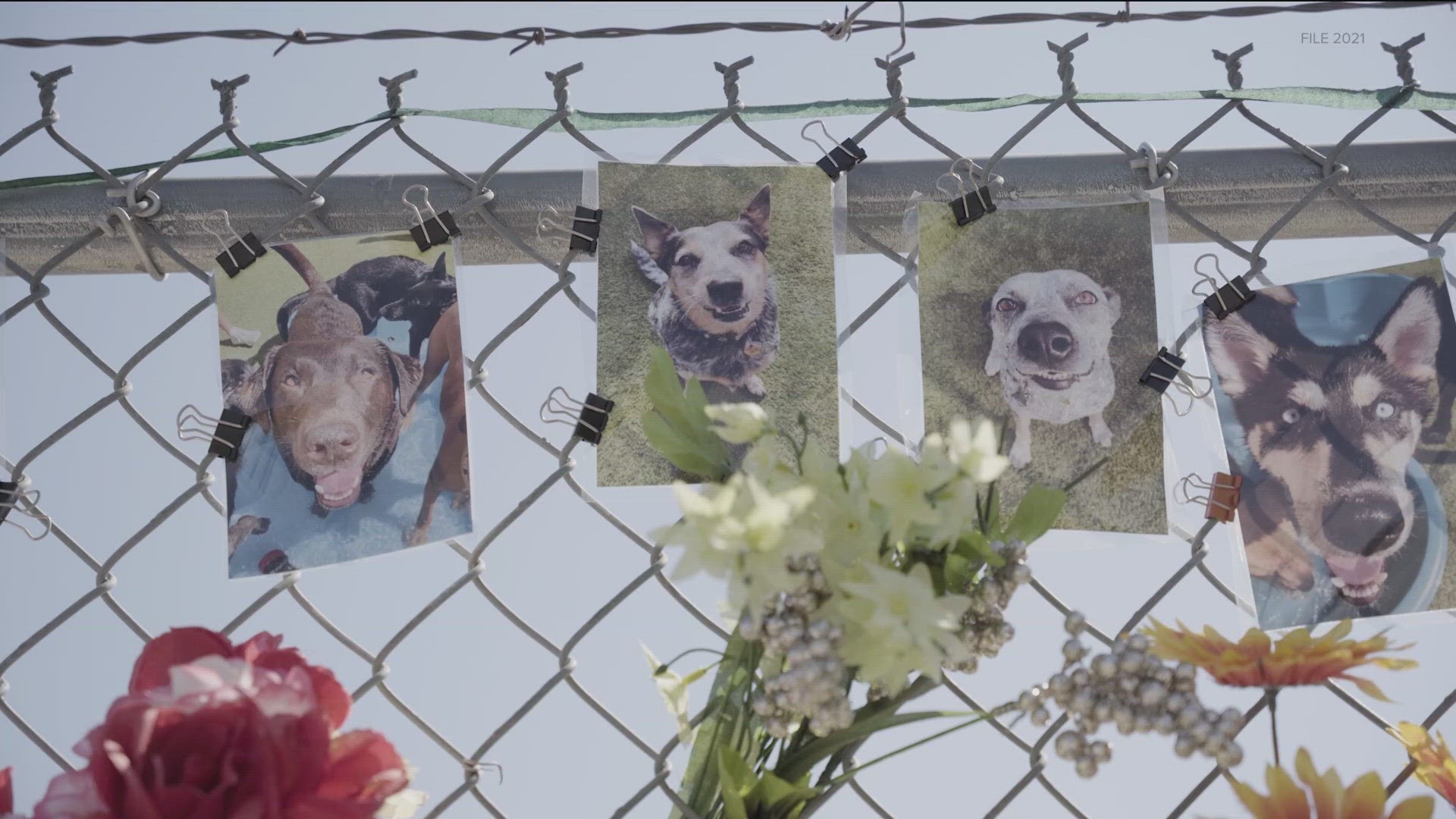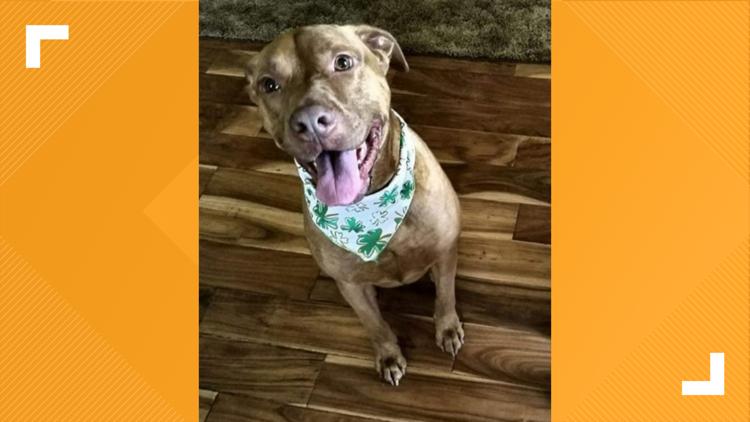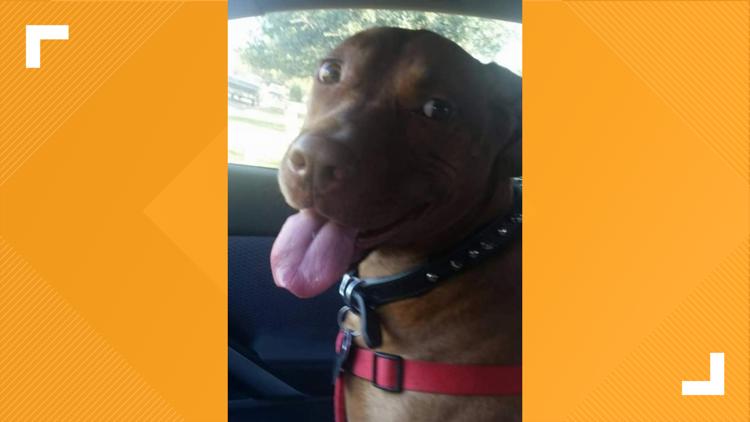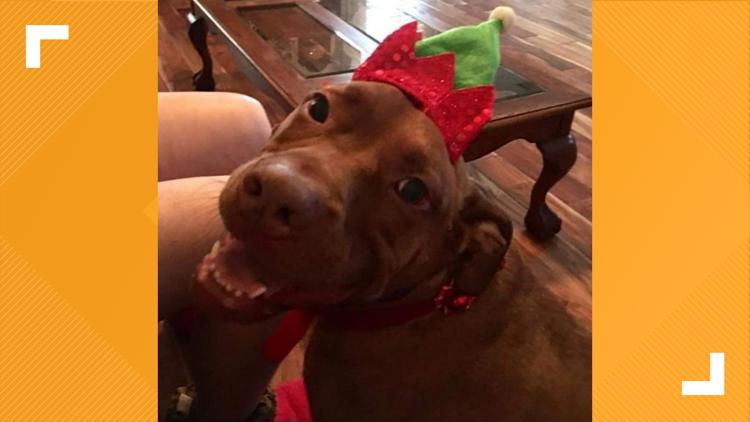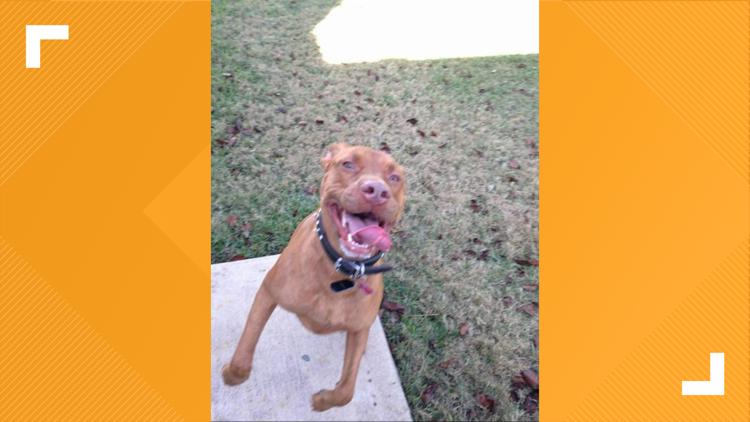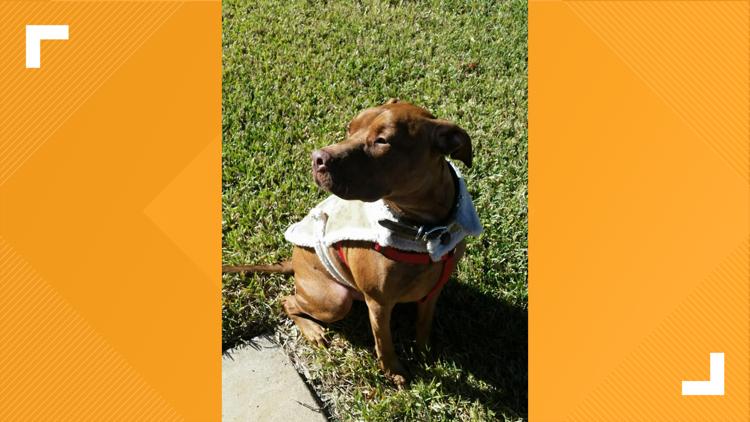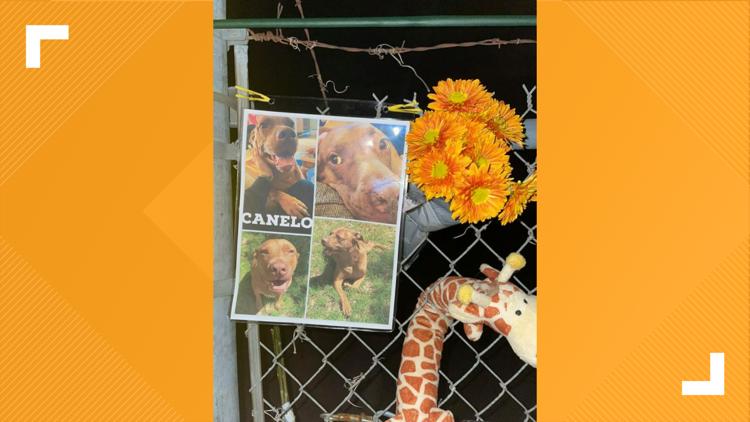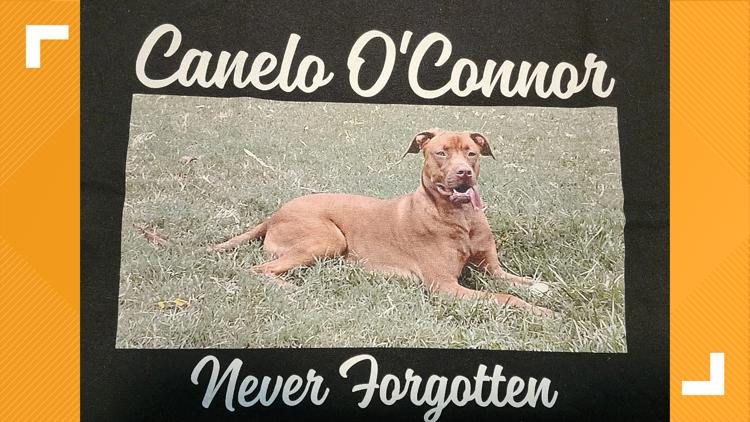GEORGETOWN, Texas — “He was just a goofball,” Samantha O'Connor said as she looked at videos of her dog, Canelo, on her phone.
O’Connor said she couldn't watch these videos until now. The pain is still fresh, two-and-a-half years later.
“He was such a pure soul,” O’Conner said.
Canelo died on September 18, 2021, in a fire at the Ponderosa Pet Resort in Georgetown that killed 75 dogs.
“It changed me a lot. I was diagnosed with PTSD. I couldn't even – I couldn’t even be in my house for a while after it happened,” O’Conner said.
Fifty-nine families lost pets in the fire.
What happened?
Fire investigators officially ruled the cause of the fire “undetermined” but narrowed the reason to possible electrical problems.
The city of Georgetown's website shows the possibilities include:
- “One of two blower motors failed and melted plastic around them to its ignition point.
- The air purifier failed and melted the plastic to its ignition point.
- The rodent deterrent ignited in wall plug and caught the surrounding material on fire.
- The extension cord failed, melted through sheathing, and caught the surrounding material on fire.
- The insect killer created an environment that sustained a flame and melted, catching area around it on fire.
- Failure of building electrical system.”
Immediately following the fire, Georgetown Fire Chief John Sullivan said smoke and flames built inside the building for at least 12 minutes before the fire department was notified.
“We know the animals were alive up until that point,” Sullivan said on Oct. 1, 2021.
Sullivan said they could have likely saved some of the lives if they knew sooner.
“The fact that a fire got as large as it did before 911 was accessed had everything to do with the fact that there was not a smoke alarm or heat alarm device that was required in that type of a building,” Sullivan said.
The business had no overnight staff, no fire monitoring and no sprinklers.
“I have a lot of ‘what ifs’ and ‘if onlys’ since that day, and I think ‘if only this’ or ‘what if that.’ And I don't know if that will ever go away," O'Connor said. "I feel like I let him down."
The night of the fire was Canelo’s first overnight boarding. O’Connor said it was training for both of them to move past post-pandemic separation anxiety.
“Every time I closed my eyes, I had really bad pictures of them trapped in the crates,” Emily Jaeger told the KVUE Defenders in 2021.
Jaeger’s dogs, Shoes and Coaster, died in the fire.
“Shoes had obviously tried to get out of the crate – desperately, based on the condition of her mouth and face. Her teeth were broken and bloody. There was blood all over. Clearly, there was an effort to get out,” Jaeger said.
“You don't want to think about what they went through,” O’Connor said.
O’Connor said Canelo’s collar was covered in blood, with a scent she couldn’t get out.
PHOTOS: Canelo O'Connor, a victim of the Ponderosa Pet Resort fire in Georgetown
A push for widespread change
The KVUE Defenders acquired dozens of emails and comments made to the city of Georgetown for months following the fire. Eighty percent of the people wrote they wanted fire sprinklers.
One voice heard that call and chose to help fight for change. Fire Protection Engineer Jeffery Shapiro with Lake Travis Fire and Rescue filed a proposal to change the International Fire Code.
“I think it's time that we pay close attention ... Pets are part of people's families,” Shapiro said.
The proposal, if approved, would add fire safety for all dog and cat boarding facilities – things like an automatic fire sprinkler system or having at least one person working with a fire and carbon monoxide alarm system.
“You always get pushback from the business community with regard to cost and whether the government is too restrictive or there's too many regulations," Shapiro said. "And I do understand that, in the past. But this proposal accommodates that by basically setting the standard the same for our pets as for people."
In Texas, though, pets are considered property.
“You love your pet like you love a family member. And I think everyone should agree that this is something that we should be doing,” Shapiro said.
Pushback may come from within the pet industry itself. The American Kennel Club (AKC) and the Texas Veterinary Medical Association (TVMA) are against mandating automatic sprinklers or 24-hour staffing with fire alarms.
A bill, House Bill 66, filed in the Texas House of Representatives last legislative session, would have required fire alarms with minimum staffing or fire sprinklers for boarding facilities.
The AKC wrote on its website how it “expressed concerns” about the bill. The legislation went nowhere.
“AKC expressed concerns to the HB 66 bill sponsor and, ultimately, HB 2063 was filed with positive amendments,” AKC’s website shows.
AKC refused to do an interview and refused to answer why it opposes such regulation.
The TVMA told the KVUE Defenders, “We do not support additional regulation of veterinary practices that raise the cost of care for families with animals.”
State Rep. James Talarico filed a bill, House Bill 2063, to require pet boarding facilities to notify pet owners if the facility is not equipped with fire sprinklers or 24-hour monitoring.
However, that law also faced criticism from the pet care industry.
Trent Hightower with the TVMA told Texas lawmakers since animals are considered property, businesses should not be punished for failing to inform customers unless “something were to happen.”
“We don't want to see businesses get in trouble for what is, essentially, a record-keeping violation,” Hightower said in a House Business & Industry Committee hearing in April of 2023.
HB 2063 became law last September. If a facility does not comply, the business can be fined $500 per animal, per day.
Central Texas kennel safety changes
“When you have an animal boarding situation, they're pretty much captive to whatever the situation is,” Cindy Giedraitis, the regional manager for the National Fire Sprinkler Association, said.
Giedraitis said fires at boarding centers put firefighters in danger, too.
“They're going to put themselves in harm's way to, to rescue any living thing,” Giedraitis said.
After the Ponderosa fire, cities across Central Texas changed their fire codes to add kennel fire and safety rules.
The Georgetown City Council approved fire code changes on Feb. 23, 2022. All existing facilities must now have a supervised fire alarm system. The code states:
"All newly constructed animal-care facilities must have a fire sprinkler system or
- "A facility with 50 or fewer animals on-site that has 1) a supervised fire alarm system; and 2) Class A finish on the walls (similar to the drywall that is used in residential garages) would not be required to install a sprinkler system.
- A facility with 51 to 100 animals on-site that has 1) a supervised fire alarm system; 2) fire resistive materials surrounding the kennel area; and 3) Class A finish on the walls would not be required to install a sprinkler system.
- A facility with 101 or more animals on-site that 1) provides all animals immediate, unobstructed access outside; 2) has a supervised fire alarm system; and 3) provides constant supervision would not be required to install a sprinkler system."
“Unless sprinklers are otherwise required by the City’s Building or Fire codes, a facility is not required to install a sprinkler system if it provides 24-hour, on-site supervision. Such facilities will have to install an approved fire alarm system,” the city of Georgetown's website shows.
All newly-built animal care facilities must also have carbon-monoxide detection systems with electronic supervision. Equestrian facilities are exempted from the new fire-code requirements for animal-care facilities.
Austin City Council members passed a resolution to figure out what changes the code needs, but records show nothing has been decided.
The Round Rock City Council approved fire code changes on Apr. 13, 2023.
“Any 24-hour animal housing and care facility built after the adoption of the amendment must now be equipped with a monitored sprinkler and detection system regardless of square footage. Existing businesses that meet the criteria for necessary changes will be given two years to come into compliance with the newly amended ordinance to allow for plan review and acceptance, installation and budgeting,” a press release from the city of Round Rock shows.
Cedar Park leaders adopted an ordinance on Oct. 26, 2023, that says in part, “A new subsection 907.2.2.2 Animal Housing or Care Facility shall be added to read as follows: Fire areas containing an animal housing or care facility shall be provided with an electronically supervised automatic smoke detection system when animals are restrained in kennels or crates, or by other equipment that would prevent the animals from escaping to an exterior area of safety. In unconditioned spaces, in lieu of smoke detection, the alarm system may be activated by quick response heat detectors.”
The law permits two exceptions:
- “Smoke detectors and/or quick response heat detectors are not required where the building is equipped throughout with an automatic sprinkler system…
- Where animals are provided constant supervision."
Leander city leaders passed and approved fire code changes in the city on July 20, 2023. Leander's ordinance shows certain animal facilities must provide an automatic fire protection sprinkler “when the animals are not provided with constant supervision.” Areas containing animal housing must also have an electronically supervised smoke detection system if there is no automatic fire sprinkler system installed or under constant supervision.
Austin lags behind other Central Texas cities. The city council passed a resolution to change the city’s Land Development Code to provide minimum fire safety standards for kennels operating 24 hours. But Austin Planning Department records show changes were dropped from the Land Development Code schedule.
“Fire Safety Standards for Animal Facilities was removed from the schedule because it was determined to be a technical code amendment and not an amendment to City Code Title 25 (Land Development Code),” a Sept. 18, 2023 update shows.
On Dec. 6, 2023, Austin Fire Chief Joel Baker wrote a memo to the mayor and council members about fire safety for kennels.
“The Austin Fire Marshall proposes to address fire safety in 24-hr animal care facilities by amending the current Ordinance to require smoke detection in all new facilities and in some cases automatic sprinklers. Existing facilities will have 2 years from date of adoption to install a compliant smoke detection system,” the memo shows.
Baker wrote that the Austin Fire Department is ready to publish the proposal for public comment. But that hasn’t happened.
Shapiro said the international fire code gets reviewed every three years. He said his proposal won’t get voted on until the end of the year.
And even if the international fire code is changed, local governments can still choose to write their own rules.
Continuing the fight
It took two years for O’Connor to open her home to another dog.
She said she pays $35 a month for her fire and carbon monoxide alarm monitoring. If something should happen, the fire department will be notified immediately.
While she said she doesn’t think she will ever use a boarding facility again, she said she knows some facilities do care about protecting the animals. She spends her free time pushing for more fire safety protection standards at boarding facilities
"I'm Canelo's voice. I have to continue to speak for him,” O’Connor said.
O’Connor and nearly two dozen others sued Ponderosa Pet Resort shortly after the fire. O’Connor wouldn’t speak about the lawsuit because it is still pending.

